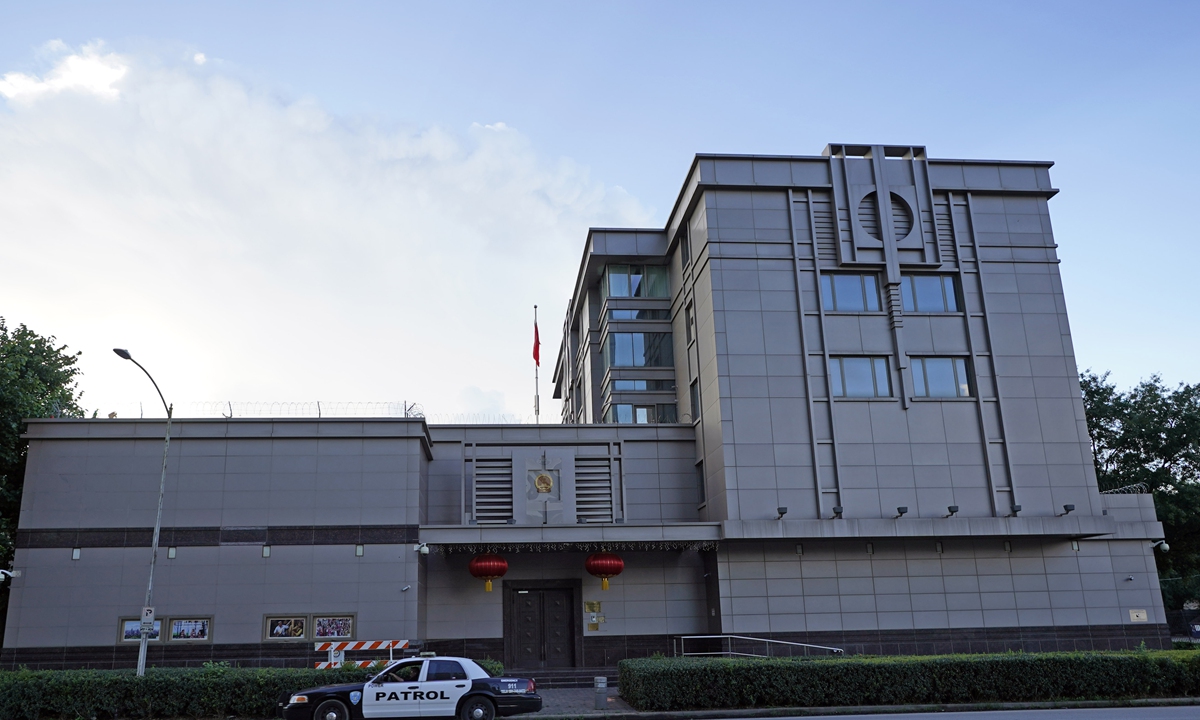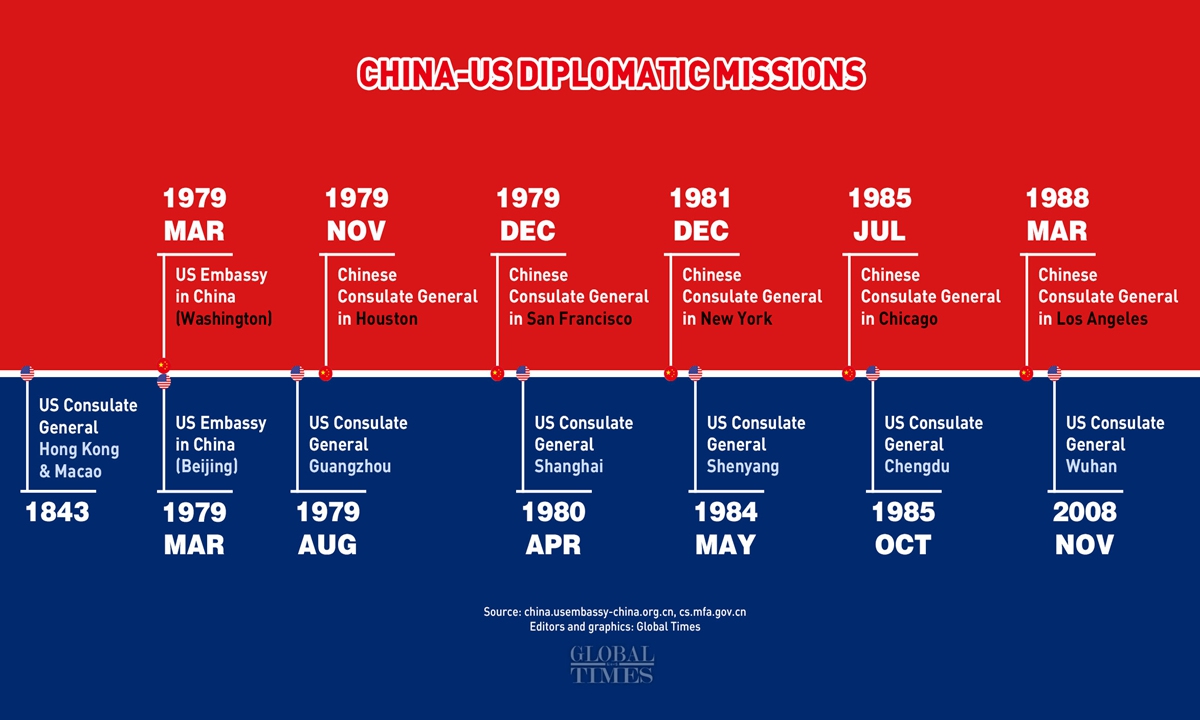Update: China’s countermeasures to cause the US real pain over closure order of Chinese Consulate General in Houston
By GT staff reporters Source: Global Times Published: 2020/7/22 15:36:17 Last Updated: 2020/7/22 23:36:17
Easing China-US ties impossible under Trump govt: experts

A security guard drives away from the Chinese Consulate General in Houston on Wednesday. Photo: AP
China's Foreign Ministry on Wednesday strongly condemned the US for asking China to close its Consulate General in Houston, a reckless and dangerous move which analysts said will further flare up tensions between the two largest economies in the world.
On Tuesday local time, the US abruptly asked China to close its Consulate General in Houston in 72 hours. This is a unilateral political provocation by the US side against China, a grave violation of the international law and basic norms governing international relations, a grave violation of relevant provisions of the China-US consular treaty, and a deliberate attempt to undermine China-US relations, Wang Wenbin, spokesperson of the Chinese Foreign Ministry, said on Wednesday.
The Chinese side strongly condemned the move, and urged the US to immediately correct its mistakes. Otherwise, China will make a legitimate and necessary response, the spokesperson said.
For some time, the US has been attacking and launching smear campaigns against China, and unreasonably made trouble for staff members at Chinese consulates. The latest move to ask China to close its Consulate General in Houston is an unprecedented escalation of its moves against China, the spokesperson said.
In October 2019 and June 2020, the US side twice imposed restrictions on Chinese diplomatic staff in the US, opened Chinese diplomatic packages privately on many occasions, and seized Chinese official supplies, the spokesperson said.
As a result of the recent indiscriminate stigmatization and incitement of hatred by the US, bomb and death threats have been made against Chinese diplomatic missions and personnel in the US, the spokesperson said.
The website of the US Embassy in China often publishes articles openly attacking China. It is clear who is interfering in other countries' internal affairs and who is infiltrating and inciting confrontations, he said.
The Consulate General in Houston is the first Chinese consulate general established in the US. Several Chinese experts on China-US relations said, "Washington is completely out of the line," while one expert suggested that China could take countermeasures such as shutting down the US Consulate General in Hong Kong.
Observers also called the move "unprecedented", saying it would trigger a broader earthquake in diplomatic ties between the two countries.
Some video footage circulating on social media showed documents being burned in the courtyard of the consulate general on Wednesday, with police and firefighters outside the embassy.
The last time the Trump administration ordered a foreign consulate on American territory to close was in August 2017, when it ordered Russia to close its consulate in San Francisco and two diplomatic annexes, in New York and Washington, "bearing all of the hallmarks of a Cold War-era grudge match," according to the New York Times.
Xin Qiang, deputy director of the Center for American Studies at Fudan University in Shanghai, told the Global Times on Wednesday that the US move, which is unprecedented in the history of China-US relations, indicated a serious escalation in bilateral confrontations and will definitely result in countermeasures from China.
Xin said that asking the Chinese consulate general to close down on a short notice is very rude, and is tantamount to eviction.
The US move disregards the consequences of all-around deterioration in bilateral ties and it seems that easing China-US relations is almost impossible during the Trump administration, Xin said.
He said that the US takes the full responsibility for the deterioration in bilateral ties, and under the current circumstances, the US may expel some Chinese diplomats in the US, Xin said.
Some US-China relations observers and legal experts also suggested that it is possible that China will ask the US to close the US Consulate General in Hong Kong as a countermeasure, a move which is conducive for Hong Kong's stability, as US consulate staff there have played a role in the months-long unrest in Hong Kong last year, observers said.
Such a suggestion also reflected public opinion. In an online poll conducted by the Global Times Wednesday asking netizens that as a countermeasure, "which US consulate general in China is most likely to be closed?" Over 8,600 netizens cast their votes as of 9:30 pm on Wednesday, and nearly 80 percent voted for the US consulate general in Hong Kong and Macao on Chinese Twitter-like Weibo.
Although it doesn't represent the official options for countermeasures, it represents a certain level of Chinese public sentiment, some observers suggested.
"Such poll result vividly reflected the public anger over the US meddling in Hong Kong affairs," Tian Feilong, a member of Beijing-based Chinese Association of Hong Kong and Macao Studies, told the Global Times on Wednesday.
The same poll on Twitter garnered nearly 10,000 respondents, with 64.9 percent voted for the US consulate general in Hong Kong and Macao, 10.4 percent voted for the one in Guangzhou and 7.8 percent voted for the one in Chengdu.
China is considering ordering the closure of the US consulate in Wuhan, Central China's Hubei Province, Reuters said on Wednesday, citing a person with direct knowledge of the matter.
However, those who speculate that China will shut the US consulate in Wuhan in retaliation are underestimating Chinese government's will. As staff has not returned to Wuhan consulate, so a closure would not be an equivalent countermeasure compared with the US bullying tactics, said observers.
The US' move came after reports claiming that some US diplomats have not been able to return to China as Washington and Beijing cannot agree on testing and quarantine procedures for diplomats and their families. However, insider said that this is not the reason that the US asked China to close consulate in Houston. The US doesn't have any reasonable excuse at all for this action, people who are familiar with the situation said.
Chinese Foreign Ministry spokesperson Zhao Lijian said on July 2 that China and the US have been in close communication on the return of American diplomats to China, and we already helped the US to arrange a charter flight to bring back their diplomats after bilateral consultations.
Our quarantine measures apply equally to all foreign diplomatic missions to China, Zhao said.

Infographic:GT
Violating Constitution & international norms
The US ratified the Vienna Convention on Consular Relations in 1969 as well as the optional protocol to the convention, the convention has legal precedence over the application of other domestic law, however, the US' unilateral request for China to close its consulate is an act of intentionally bypassing international treaty obligations and the US Constitution. The move is intended to exert extreme pressure on China, Peng Qinxuan, associate researcher of the Institute of International Law of Wuhan University, told the Global Times on Wednesday.
According to Article 25 and Article 27 of the convention, the US, as a recipient country, has the obligation to provide diplomatic personnel with sufficient facilities to perform their duties and should protect and allow embassies to communicate freely for all official purposes, Peng noted. However, as described by the Chinese FM, the US imposed unwarranted restrictions on Chinese diplomats in the US, opened Chinese diplomatic packages privately on many occasions and seized Chinese official supplies, all of which violated treaty obligations and the Constitution, the legal expert said.
Closing the consulate will have an impact on Chinese people living there, as Texas is one of the US states that has suffered most from the COVID-19 epidemic. Local businesses, people-to-people exchanges and communications with China will also be affected, Lü Xiang, a research fellow at the Chinese Academy of Social Sciences in Beijing, told the Global Times on Wednesday.
Li Haidong, a professor at the Institute of International Relations of the China Foreign Affairs University, described the move as "a typical gesture" of adventurism from the Trump administration, which would do anything to achieve its political goals, even "further sabotaging" US-China ties.
"We are at a tipping point that is highly dangerous, and we should respond in a reciprocal manner, and also in a very careful way in order to avoid further worsening the confrontation," he said.
Posted in: POLITICS